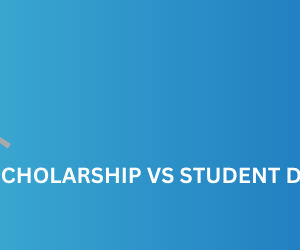
Avoiding Student Loans: A Life-Changing Decision to Break Free from Debt
In today’s society, the burden of student loans has become a formidable obstacle for countless young individuals striving to achieve their dreams. By opting to avoid student loans, an unparalleled opportunity presents itself to set the tone for a life free from burdensome debt. But how exactly does this decision impact one’s financial future?
Understanding the Consequences of Student Loans
Student loans have become synonymous with the pursuit of higher education, but they come with significant consequences. These loans accrue interest over time, resulting in larger debt burdens for graduates. Additionally, the repayment terms can stretch for many years, often leaving borrowers in a never-ending cycle of debt. The monthly payments can be overwhelming, making it difficult for individuals to save, invest, or achieve other financial goals. By avoiding student loans altogether, one can steer clear of these detrimental consequences and forge a different path towards financial freedom.
Alternatives to Student Loans: Scholarships, Grants, and Work-Study Programs
The good news is that there are various alternatives to student loans that can help fund education without the burden of debt. Scholarships, grants, and work-study programs offer opportunities to minimize or eliminate the need for loans. Scholarships are merit-based or need-based awards that can cover a significant portion, if not all, of the tuition fees. Grants, on the other hand, are typically need-based and do not require repayment. Work-study programs provide part-time employment opportunities on campus, allowing students to earn money while pursuing their studies. By exploring these alternatives, individuals can reduce their reliance on loans and potentially graduate debt-free.
The Importance of Financial Planning and Budgeting for College Expenses
Avoiding student loans requires careful financial planning and budgeting. It is crucial to have a clear understanding of college expenses, including tuition fees, textbooks, housing, and living costs. By creating a realistic budget and sticking to it, students can make informed decisions about their spending habits and prioritize their financial resources. This process cultivates essential skills that go beyond college, ensuring individuals develop a solid foundation for managing their finances throughout their lives.
Exploring Community College and Trade School Options
Community colleges and trade schools provide valuable alternatives to traditional four-year universities. These institutions offer affordable education and vocational training that can lead to lucrative careers without the need for expensive degrees. Community colleges often have transfer agreements with four-year universities, allowing students to complete their general education requirements at a lower cost before transferring. Trade schools focus on specific industries, equipping students with practical skills that are in high demand. By considering these options, individuals can pursue education without incurring significant debt while still accessing quality learning opportunities.
Considering In-State Universities and Tuition Assistance Programs
For those determined to attend a four-year university, considering in-state schools can significantly reduce the financial burden. In-state universities generally offer lower tuition rates for residents, making them a more affordable option. Additionally, many states offer tuition assistance programs that provide financial aid to eligible students. These programs can cover a portion of tuition fees or provide grants based on academic achievement or financial need. By exploring in-state universities and tuition assistance programs, individuals can make education more affordable and minimize their reliance on loans.
The Role of Part-Time Jobs and Internships in Funding Education
Part-time jobs and internships can play a crucial role in funding education while avoiding student loans. By working while attending school, students can earn money to cover their expenses and reduce the need for loans. Part-time jobs can provide valuable work experience and financial independence. Internships, on the other hand, offer opportunities to gain practical skills and make connections in specific industries. Some internships may even offer stipends or scholarships to help offset educational costs. By taking advantage of these opportunities, students can actively contribute to their education and reduce their reliance on loans.
Building Credit and Managing Expenses During College
Building credit and managing expenses during college are essential steps towards financial independence. Responsible credit card usage and timely bill payments can help establish a positive credit history, which is crucial for future financial endeavors. It is important to create a realistic budget, track expenses, and avoid unnecessary debt. By practicing good financial habits during college, individuals can avoid falling into the trap of excessive debt and set a solid foundation for their financial future.
Long-Term Financial Benefits of Avoiding Student Loans
The long-term financial benefits of avoiding student loans are significant. By graduating debt-free, individuals have the opportunity to start their post-college life on a strong financial footing. They can allocate their resources towards savings, investments, or pursuing other personal and professional goals. Without the burden of loan repayments, individuals have more freedom to make choices that align with their aspirations and values. Additionally, a debt-free start can lead to better financial health, less stress, and increased opportunities for future financial growth.
Conclusion: Empowering Yourself to Make Informed Decisions about Education and Finances
Avoiding student loans is a life-changing decision that sets the tone for a debt-free future. By understanding the consequences of student loans, exploring alternatives, and practicing sound financial habits, individuals can take control of their education and finances. It is crucial to empower oneself with knowledge and make informed decisions about higher education. By doing so, individuals can pave the way for a brighter financial future, free from the burdens of student loan debt.
In conclusion, the decision to avoid student loans is not just about the immediate financial impact but also about setting the stage for a lifetime of financial freedom. By taking advantage of scholarships, grants, work-study programs, and other alternatives, individuals can minimize or eliminate the need for loans. Additionally, cultivating good financial habits, considering affordable education options, and exploring part-time jobs and internships can further contribute to a debt-free journey. Ultimately, the choice to avoid student loans is an investment in one’s future, allowing for greater flexibility, opportunities, and financial well-being. So, take control of your financial destiny and break free from the chains of student loan debt. Your future self will thank you.


